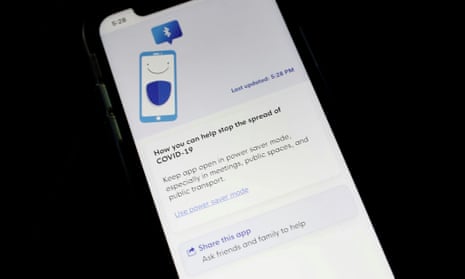The NHS is in a standoff with Apple and Google after the two tech firms refused to support the UK’s plans to build an app that alerts users when they have been in contact with someone with coronavirus.
Apple and Google are encouraging health services worldwide to build contact-tracing apps that operate in a decentralised way, allowing individuals to know when they’ve been in contact with an infected person but preventing governments from using that data to build a picture of population movements in aggregate.
But the policies, unveiled last week, apply only to apps that don’t result in the creation of a centralised database of contacts. That means that if the NHS goes ahead with its original plans, its app would face severe limitations on its operation.
The app would not work if the phone’s screen was turned off or if an app other than the contact tracer was being used at the same time. It would require the screen to be active all the time, rapidly running down battery life, and would leave users’ personal data at risk if their phone was lost or stolen while the app was in use.
A spokesperson for NHSX – the the health service’s digital transformation arm – denied claims of a “standoff”, saying: “This suggestion is completely wrong. Everyone is in agreement that user privacy is paramount, and while our app is not dependent on the changes they are making, we believe they will be helpful and complementary.”
The limitations mirror problems faced by Singapore, which released its contact-tracing app, TraceTogether, before Apple and Google announced their policies. The app, which has a three-star rating on Singapore’s App Store, has been installed by just 12% of the population.
“The important thing here is, if you want your iPhones to work with this in your country, then you’ll need to effectively adhere to Apple’s standard of privacy for the system,” said Dr Michael Veale, a lecturer in digital rights and regulation at UCL.
“Apple have said that the standard of privacy that they are demanding is a decentralised system. Otherwise, it will be very difficult to get iPhones to work with it without a workaround that will just stop people using it.”
The limits exist because modern smartphones tightly control what apps can do with technologies such as Bluetooth, in order to prevent infringements of privacy. On iPhones, for example, a normal app has strictly limited access to Bluetooth unless it is running in the “foreground” – meaning actively on screen and in use – in order to prevent apps from surreptitiously tracking users without consent.
The NHS had been hoping those limits would be lifted for Covid-19 contact-tracing apps, according to a source with knowledge of the app development.
On Friday in a joint announcement, Apple and Google announced their intention to do that, introducing a new set of tools that public health authorities could use from May to build apps that can perform contact tracing in the background.
But the new tools, which come in the form of an API that lets developers code apps with special access to Bluetooth, strictly limit the information that public health authorities can gather. Most importantly, a public health authority cannot ask a phone to gather a list of every other phone it has been in contact with.
Instead, it can only perform a much more limited version of contact tracing, which involves sending every phone in the system a list of other phones that have been reported as contagious, and asking them, in effect, “have you seen this phone?” said Veale.
The limits will prevent the NHS from obtaining useful information about population flows in the aggregate, tracking “near misses” or receiving information about contacts from people who have opted into the system but not recently checked their phones.
On a press call to journalists on Tuesday evening, Google said those limits were in place because neither company wanted to provide functionality in their operating systems to allow for surveillance efforts that could be abused.
